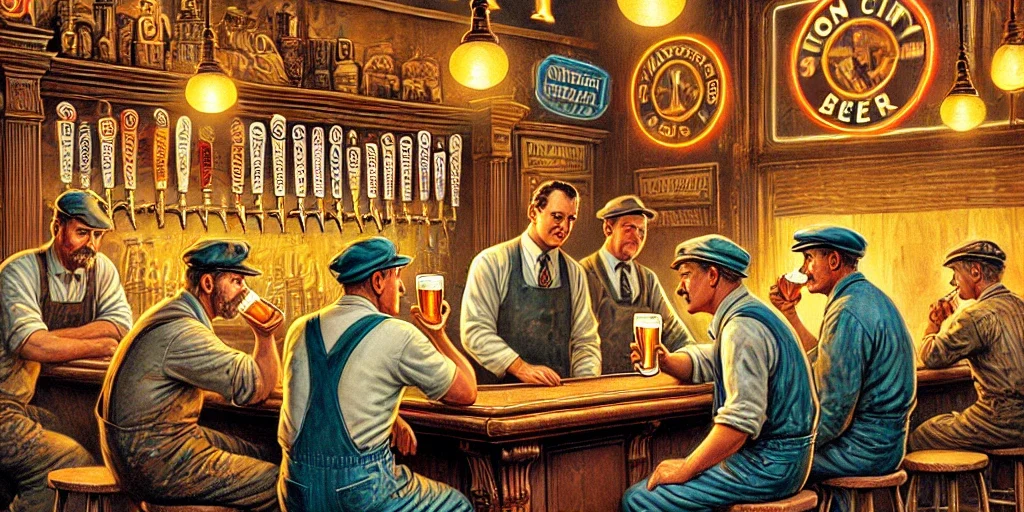Before the breweries and gastropubs of today, Pittsburgh’s drinking culture was forged in the smoke and fire of the steel mills. For decades, steelworkers spent grueling hours in blistering heat, shaping molten metal into the backbone of America’s industrial empire. And when the shift ended, they headed straight to their neighborhood bars—places where they could shake off the grime, share stories, and unwind with an Iron City Beer in hand.
These were no-frills, working-class institutions—dimly lit, cash-only, and built on camaraderie. While many of these legendary bars have disappeared along with the mills, a few remain, standing as testaments to Pittsburgh’s blue-collar past. Let’s take a trip through some of the most iconic steelworker bars that kept the city’s labor force fueled and its stories alive.
Riverview Inn (Homestead)
One of the last true steelworker bars standing, the Riverview Inn sits just a stone’s throw from the site of the old Homestead Steel Works. A favorite among former millworkers, the bar still carries the atmosphere of its heyday—worn wooden barstools, walls covered in steel industry memorabilia, and regulars who have been drinking there for decades. It’s a place where stories of the infamous Homestead Strike of 1892 still echo in conversations, and where respect for the working class runs deep.
Redbeard’s (Mount Washington, Formerly South Side)
Originally founded as a classic South Side steelworker hangout, Redbeard’s has since relocated to Mount Washington, but its roots in Pittsburgh’s labor history remain. In its original form, it was a haven for workers coming off shifts at Jones & Laughlin Steel. Though the South Side location is gone, the spirit of Redbeard’s carries on—where locals still gather to raise a pint in honor of Pittsburgh’s steel heritage.
Gooski’s (Polish Hill)
Though not exclusive to steelworkers, Gooski’s has long been a bar where the working class of Pittsburgh mingles with artists, musicians, and locals looking for a strong drink and an unpretentious atmosphere. Nestled in Polish Hill, a neighborhood built by Eastern European immigrants who worked the mills, Gooski’s still has the rugged feel of an old steelworker bar—cheap beer, thick cigarette smoke, and the kind of jukebox selections that make you want to stay all night.
Jack’s Bar (South Side)
Jack’s Bar is a Pittsburgh institution. One of the longest-running dive bars in the city, it has been serving up cheap beer and shots since the days when steelworkers would flood the streets of the South Side after a long shift. Today, it’s an eclectic mix of old-timers and younger patrons, but it still carries the same working-class soul that made it a steelworker’s go-to spot for decades.
The Squirrel Hill Cafe (Squirrel Hill)
Known locally as “The Squirrel Cage,” this unassuming bar was once a popular spot for off-duty workers looking to escape the chaos of the mills. While the neighborhood around it has changed over the years, The Squirrel Hill Cafe has stayed true to its roots—serving cold beer, stiff drinks, and conversation in a space that feels timeless.
The Decline and Legacy of the Steelworker Bars
As Pittsburgh’s steel industry collapsed in the 1980s, many of these bars saw their patrons vanish along with their jobs. Some reinvented themselves, some closed their doors forever, and a few held on as reminders of a bygone era. What remains, however, is the spirit of these gathering places—where hard work was respected, where a round was always shared, and where stories of Pittsburgh’s industrial past live on. Some of these same bars even brushed up against Pittsburgh’s darker history — playing host to whispers of mob deals, numbers rackets, and the city’s notorious gangsters and crime stories.
Today, the city’s drinking culture has evolved, but a trip to one of these legendary bars is like stepping into history. They may not be filled with soot-covered workers anymore, but the ghosts of Pittsburgh’s steel empire are still there, lingering in the dim lights and the clinking of beer bottles. So next time you raise a glass in one of these establishments, remember: you’re not just drinking a beer—you’re drinking a piece of Pittsburgh’s history.









